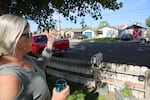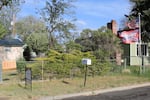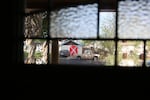Four years ago, Marcia Hilber bought a home in Prineville as an investment in her retirement.
She estimates spending thousands of hours perfecting the yard, and thousands of dollars repairing the house.
The 61-year-old real estate broker is proud to show off her property.
“It’s like a little paradise, a little oasis in downtown Prineville,” Hilber said on a recent spring day, as a breeze wafted through her immaculately kept patio, rustling the leaves of a towering shade tree.
But, what she didn’t count on, is how her home’s view would change. She pointed across the street in disgust.
“It’s an entire garage door painted as the Confederate flag, which came about last summer,” Hilber said.

Marcia Hilber gestures to a neighbor's property on May 17, 2021.
Emily Cureton Cook
The flag was originally flown by an army that fought to preserve the enslavement of Black Americans. Now, it waves from numerous houses in the heart of Prineville. Hilber believes the symbol revived last summer, as the town saw Black Lives Matter protests. Less than 1% of the local population is Black.
“Do I want to live the rest of my life and retire in a town where this is becoming more and more acceptable and pronounced? Absolutely not,” Hilber said.
But for many younger buyers, affordable housing options are scant. Bend-based real estate broker Christy Evans had some choice words for the market right now.
“Insane. Crazy. Bonkers,” said Evans, who represents buyers. “There’s no inventory.”
In Bend, homes are selling in just four days on average. The area’s prices have gone up more than 40% since the pandemic began, according to a state certified residential appraiser’s monthly reports.
The lack of affordable homes in Central Oregon’s cities is driving some would-be first time buyers to give up. Others are moving to more rural, conservative areas. These shifting demographics come after a tumultuous election year, and as a backlash to racial justice movements continues to energize far-right extremist causes, which have increasingly appropriated historically racist symbols like the Confederate flag.

Flags in a Prineville yard combine the text of the 2nd Amendment, Confederate imagery, and political support for former President Donald Trump. The house next door has a for sale sign up on May 17, 2021.
Emily Cureton Cook

Flags outside one Prineville home combine references to the 2nd Amendment, the Confederate battle flag and political support for former President Donald Trump, as the home next door is for sale. May 17, 2021.
Emily Cureton Cook
“We started to look almost out of desperation,” said Margarita Podgornyi, a renter in Bend. The 28-year-old accountant and her partner feared being evicted if the duplex they’ve rented for the last seven years should sell.
Podgornyi, who is Mexican-American, said she wouldn’t feel welcome in a neighborhood with Confederate flags, but added that she did not encounter the racist symbols during her home search.
To compete for the few properties in Bend or Redmond that they could still afford, they mulled risky concessions, costly repairs, waived inspections, and considered asking prices over appraised values. Over the course of a year, they put in around 20 offer: all rejected. The couple watched helplessly as the down payment they’d long been saving, shrunk in comparison to soaring home prices.
“It was an emotional rollercoaster,” Podgornyi said. “Just when we feel like we’re ready, it seems like the goalpost moved a mile, and now, we’re back to saving again.”
For the last four years, Lauralei Garrity and a partner have rented a small two-bedroom apartment in Bend, for about $1,400 a month. This summer, they’re buying a place some 50 miles away in Prineville.
“It comes with chickens, so I have little chickens to look forward to,” said 26-year-old Garrity, smiling at the thought of her first home purchase. “And frankly, it’s the only place we could afford.”
Garrity, who is white, attended Black Lives Matter protests in the town last year, and watched as counterprotesters displayed guns, and in some cases, Confederate flags.

People in Prineville hold a counter demonstration across the street from a protest against racism in policing, on August 15, 2020.
Emily Cureton Cook
The backlash to the racial justice movement was pronounced in Prineville. A couple of weeks after the murder of George Floyd by a Minneapolis police officer triggered riots and protests nationwide, one Prineville resident displayed a noose in their own driveway.
Photos circulated on social media at the time. One picture shows a clear view of the noose from the street. The U.S. flag hangs limply in the background. Nooses have long been used to terrorize Black people in America. The Prineville Police Department got more than half a dozen complaints about the noose in June 2020. Some callers said they feared for the safety of the homeowner who appears to have displayed it, wrapping it around a driveway gate several times. One caller to police warned that a Facebook commenter had threatened to burn the house down. Another person reportedly told the dispatcher: “Black people don’t feel safe here.”
The police went to talk to the homeowner.
“We asked him if he would take it down, because we felt it was insensitive and inflammatory. He agreed to take it down, and it is no longer displayed on his property,” Prineville Police Chief Dale Cummins replied by email to one of the complaints.
“I understand your feelings, but I urge you not to let one person in 10,000 persuade your opinion of our community,” the police chief went on. “There will always be a few that just don’t get it, and there will always be tension in one form or another, but there is still a lot of good in the world! My Department will always try our best.”
Cummins himself faced accusations of targeting a local Black activist through a social media video last summer, energizing racist threats against her.
Related: In rural Oregon, threats and backlash follow racial justice protests
For Garrity, the first time home buyer priced out of progressive Bend, it’s important to find a way to live with her new neighbors.
Related: Oregon lawmakers approve criminalizing display of a noose

Lauralei Garrity at her Bend apartment on May 20, 2021.
Emily Cureton Cook
Garrity believes in “mutual aid” — neighbors helping neighbors — “and solving problems without having to bring in forces like the police.”
“If my neighbor in Prineville hoisted the Confederate flag, I would really want to try to form some kind of relationship with that person,” said the former Tennessean.
She grew up in the former slave state, and has had conversations about the flag before, like with her uncle, M.D. Kirkpatrick.
“I had a denim vest and the whole back of it was a rebel flag,” Kirkpatrick said when reached by phone at his home in Knoxville, Tennessee.
As a kid, touring Civil War battlegrounds was a family tradition, he said, and as a younger man, he had all kinds of Confederate flag stuff.
“It just represented, ‘Hey I’m from the South. And I love the South, and I’m proud of it,’” he said.
At 58, Kirkpatrick still professes love for Tennessee. But, he doesn’t wear that old vest or fly the flag anymore. He believes he wasn’t taught important facts about the Civil War in public school.
“I grew up not associating slavery with what I thought of from the battle flag. And now, I just know that you can’t separate the two, they’re one and the same.”
No single event, confrontation or conversation changed Kirkpatrick’s mind, he said. Over the years, he noticed people at the construction sites where he worked would say racist things to him, as though he was going to agree with them. He described feeling appalled when neo-Nazi activists waved the flag at an infamous rally in Charlottesville, Virginia, in 2017. Then, this year, he watched as some supporters of President Trump hoisted the rebel flag while storming the U.S. Capitol.
For Marcia Hilber, the home seller in Prineville, confronting her neighbors about the flag’s associations with slavery and racism only seemed to inspire more resistance.
“So there’s this one,” Hilber said, pointing to the painted garage door, “and then, around the corner over here, there’s another Confederate flag that just went up.”
Hilber, who is white, recalled a childhood when men openly fundraised for the Ku Klux Klan in her New Mexico town. She said she later learned her own grandfather was involved with a Kentucky chapter of the white supremacist terror group, which was infamously led by a Confederate general and slave trader.
“When this is in your face and people still live by this ideology, it just kind of scratches at that hereditary wound,” Hilber said, adding that her family’s history makes her feel obligated to challenge bigotry.
Last summer, she sent city officials an email asking them to consider passing an ordinance against hate symbols, “such as the Nazi and Confederate flags, hanging nooses, KKK garb and such.”
“The symbols … are legally considered speech and thus are constitutionally protected,” replied Prineville city attorney Jered Reid.
Hilber argued the view from her house could be a financial hit.
“This could have a real effect on property values, depending on who my buyers are, or it could take longer for me to sell my house,” she said.
Still, when she recently listed the place, the flags didn’t seem to stop buyers. She got multiple offers over the asking price on the very first day.

The view from Marcia Hilber's front door, May 17, 2021.
Emily Cureton Cook
